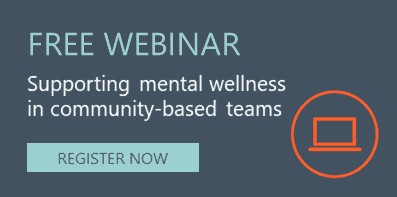For most of us, a job with more independence; enough time to support staff, clients, and patients; and less stress would be ideal. But having this kind of flexibility when so many people need help is challenging. In fact, when stressors stack up, it’s easy for community health workers and promotores (CHWs/Ps) to reach a breaking point.
[Register now for Supporting Mental Wellness in CHW Teams]
Stress on the Job
Stress is a natural response to challenging situations. Low levels of stress are not damaging or a serious threat. In fact, a little stress can be a helpful motivator.
CHWs/Ps, healthcare workers, and in fact workers in most industries regularly face countless stressors. These can pile on top of daily stressors (divorce, sickness, financial difficulties) and anxiety-inducing world events … like pandemics.
But what happens when stress leads to exhaustion, a bleak view of your work and organization, and the loss of drive and interest in daily tasks? Burnout.
Burnout in Healthcare Providers
Burnout is when someone has reached a breaking point, they’ve lost control of the stress, struggle to keep up with work, and feel growing frustration. The World Health Organization recognized workplace burnout as a real condition in 2019.
Burnout on the job happens when someone runs out of physical, emotional, mental, and spiritual energy. It happens when they’re dealing with emotionally demanding situations for a long time. People report feeling burned out when they feel tired, frustrated, and like they’re not meeting their personal or professional goals. Burnout can happen especially when CHWs/Ps are feeling stressed.
CHWs/Ps develop strong bonds with clients and report that they feel fulfilled by their jobs. However, CHWs/Ps are often called on to respond to mental health crises but may not have the training to handle these challenging situations.
Many CHWs/Ps and their teams are often overworked, which contributes to growing frustration. Taking on so many responsibilities ups their risk of depression, anxiety, burnout, and compassion fatigue.
Another common source of frustration and discouragement is when a relationship they build with a client ends. The emotional roller coaster that comes with getting involved in the lives of their community — the people in their care — makes it easy to get attached and struggle with feelings like guilt, sadness, and even anger.
When your CHWs/Ps’ mental wellness is at risk, so are their clients. And so is your program.
If you work in a close team, you might be able to easily tell if someone is feeling undue stress. In our behavioral health course, we flag these as some of the items to look for if you suspect someone needs help.
Signs of Burnout
- Sleeping too much or not enough
- Sudden weight loss or gain
- Avoiding people and activities
- Smoking or drinking more, or using drugs
- Mood swings
- Apathy and calling in sick to work
In general, you can consider any big changes in everyday life patterns and habits a red flag among your team unless there’s a clear cause for them.
Whether you feel overwhelmed by tasks, trying to balance work and home, or just looking for ways to make your job better, here’s a quiz
you can take—or give to your CHW/P staff—to help determine if you should address burnout.
Quiz: Is Your Community-Based Team Burned Out or Stressed?
Ask your team members to select the answers that best apply to them.
1. Lately have you felt exhausted and frustrated at work?
2. Have you worried that your work is making you feel cynical?
3. Have you often felt down, depressed, or hopeless?
4. Have you felt overwhelmed or like you can’t finish all your tasks?
5. Have you felt anxious, depressed, or irritable?
6. Has your physical health declined, or have you been ill more frequently?
7. Do you believe that your work is not important or appreciated?
8. Do you find yourself simply wanting to escape by reading fiction, watching TV, playing video games, using substances?
Are You Dealing with Burnout?
If responses are mostly As, that could be full-fledged burnout. Even a single yes answer can indicate signs of burnout.
As a leader, you can create healthy work conditions, build a toolbox for your team to manage stress properly, and spot red flags that may point to hidden issues before your CHWs/Ps hit a breaking point. Help your staff to recover from burnout. A healthy, motivated staff makes all the difference in performance, job happiness, and overall wellbeing for your team and the people in your care.
Photo by energepic.com from Pexels



